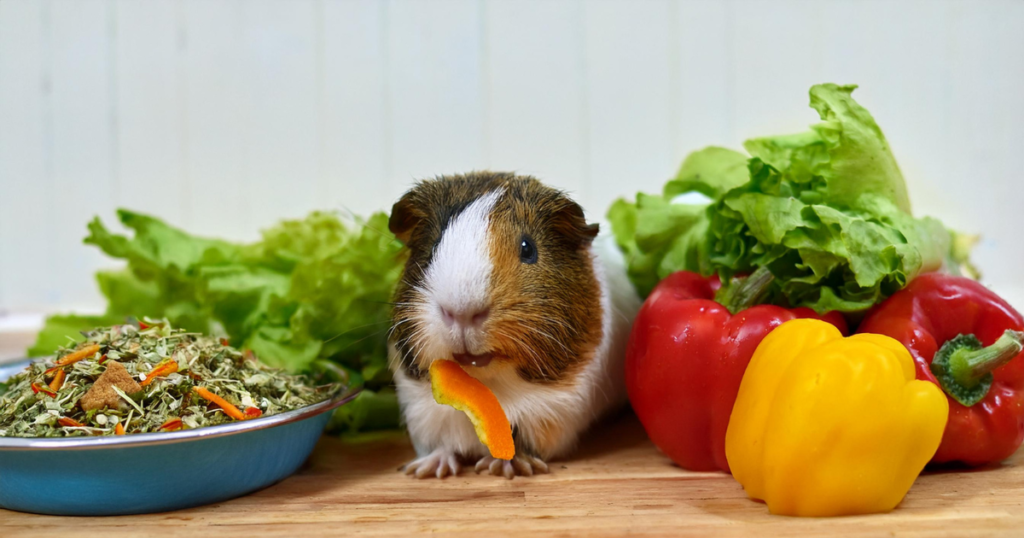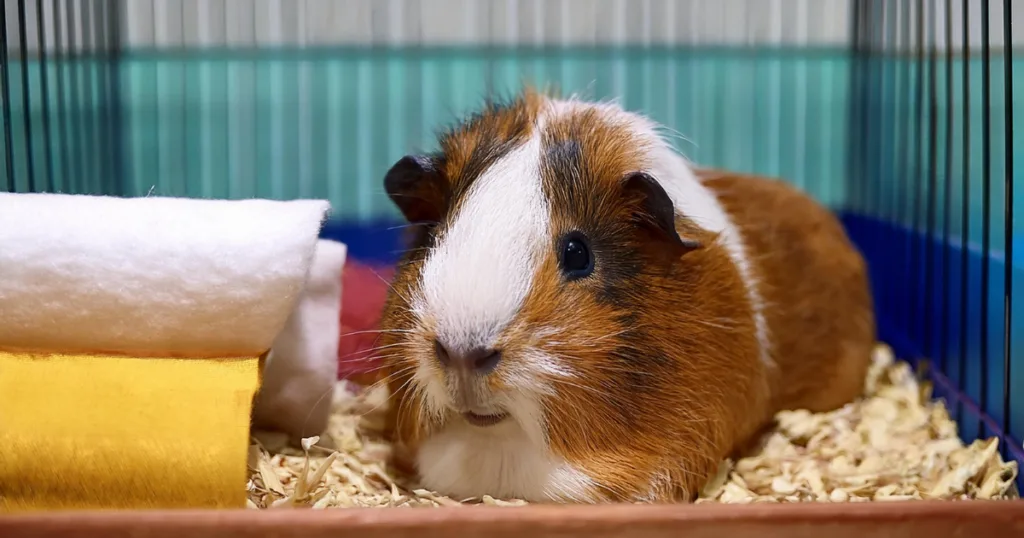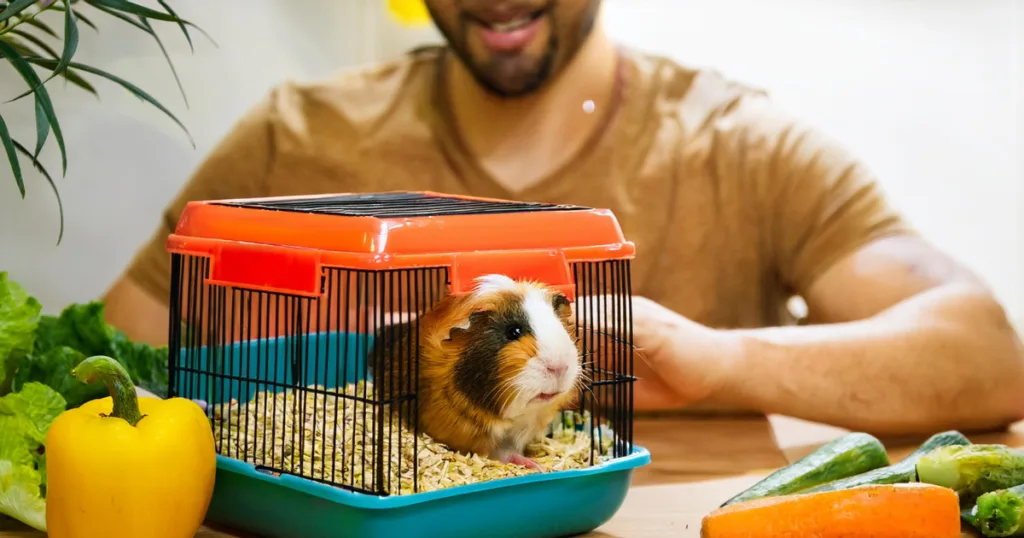Introduction
Taking care of your guinea pig’s health starts with the right diet. By offering a balanced and nutritious diet, you can help your furry friend live a long and happy life. This guide will walk you through the five essential foods that every guinea pig needs for a healthy diet. Whether you’re new to guinea pig care or just looking to improve your pet’s meals, you’ll find simple and practical tips here.

- Introduction
- 1. Hay: The Foundation of a Healthy Guinea Pig Diet
- 2. Fresh Vegetables: A Must for a Healthy Guinea Pig Diet
- 3. Pellets: Essential for Balanced Nutrition
- 4. Fruits: Sweet Treats for a Healthy Guinea Pig Diet
- 5. Herbs and Foraged Foods: Adding Natural Variety to Their Diet
- Healthy Guinea Pig Diet Tips
- Common Questions About a Healthy Guinea Pig Diet
- Conclusion
1. Hay: The Foundation of a Healthy Guinea Pig Diet
Why Hay is Crucial
Hay is the cornerstone of any healthy guinea pig diet. It’s not just a snack—it’s necessary for keeping their digestive system working properly and their teeth trimmed. High-quality hay, like Timothy hay, is fiber-rich and gentle on their stomachs. A well-balanced guinea pig diet starts with hay, as it provides the essential fiber they need to avoid health issues like obesity or digestive problems.

Types of Hay
Provide your pet with fresh Timothy hay, meadow hay, orchard grass for a healthy guinea pig diet. These are packed with fiber and support healthy digestion. You should always have fresh hay available, as guinea pigs love to nibble all day long. It helps maintain a healthy digestive tract and keeps them satisfied. Offering a variety of hay types can also prevent boredom.
Pro Tip:
Fresh hay should be offered in unlimited amounts to ensure your guinea pig gets all the fiber they need. Keep hay in a clean and accessible area, as guinea pigs prefer to eat as they go about their day.
2. Fresh Vegetables: A Must for a Healthy Guinea Pig Diet
Best Vegetables for a Healthy Guinea Pig Diet:
Leafy greens and fresh veggies are essential in a healthy guinea pig diet. Vegetables like bell peppers and romaine lettuce are rich in Vitamin C, which guinea pigs cannot produce on their own. This vitamin is crucial for their immune system and overall health. A lack of Vitamin C can lead to scurvy and other health problems, so it’s important to offer them daily.

How to Serve Vegetables
Aim for a daily serving of about one cup of fresh vegetables. Try offering a mix of healthy guinea pig foods like kale, cilantro, and spinach, but remember to rotate them to prevent boredom and digestive issues. Introducing a variety of veggies can keep mealtime exciting for your guinea pig and prevent them from becoming picky eaters.
What to Avoid
Avoid vegetables like iceberg lettuce that are low in nutrients and can lead to digestive upset. Always wash vegetables thoroughly before offering them to your pet to avoid exposure to harmful pesticides.
3. Pellets: Essential for Balanced Nutrition
The Role of Pellets
Pellets are a key part of a healthy guinea pig diet because they provide essential vitamins and minerals. Look for high-quality, Timothy-based pellets that include added Vitamin C to keep your guinea pig’s immune system strong. Pellets also help balance the nutrients in their diet, but should never be the main source of food.

How Much to Feed
A small serving—around 1/8 cup per day—is usually enough for an adult guinea pig. Pellets should complement their diet, not be the primary food source. Overfeeding pellets can contribute to obesity, so always be mindful of portion sizes.
Choosing the Right Pellets
Avoid seed-based pellets, which can cause digestive problems due to the high-fat content. Stick to pellets made specifically for guinea pigs and free from artificial colors or fillers. Quality pellets will provide the necessary fiber and nutrients for your guinea pig to thrive.
4. Fruits: Sweet Treats for a Healthy Guinea Pig Diet
Fruits in Moderation
Guinea pigs love fruits, but they should only be offered occasionally due to their high sugar content. Fruits like apples, blueberries, and strawberries are great options for a healthy guinea pig diet. These fruits provide natural sugars and vitamins that guinea pigs enjoy as a treat but shouldn’t consume too frequently.

Serving Size
Offer fruit sparingly—just a couple of small pieces a week is all they need. Too much fruit can upset their stomach and cause weight gain. Stick to healthy guinea pig foods and avoid excessive sugary snacks.
Which Fruits to Avoid
Keep away from citrus fruits like oranges and lemons, as they can be too acidic for your guinea pig’s stomach. Fruits with high sugar content, such as grapes, should also be limited to avoid potential health issues like obesity.
5. Herbs and Foraged Foods: Adding Natural Variety to Their Diet
Herbs as Healthy Guinea Pig Foods
Herbs like parsley, cilantro, and dandelion greens are safe and nutritious additions to a healthy guinea pig diet. They add flavor and extra nutrients while keeping your pet’s meals interesting. These herbs are rich in vitamins and antioxidants, offering a natural variety that can help improve your guinea pig’s health.

Foraging in Your Yard
If you have a pesticide-free garden, guinea pigs love nibbling on fresh clover or dandelions. Just be sure they’re free from any harmful chemicals. Freshly foraged foods provide your guinea pig with extra nutrients and a natural connection to their diet, though it’s important to introduce new foraged items gradually.
How to Introduce Herbs
When offering herbs, start small and watch for any digestive issues. Some guinea pigs may experience gas or bloating from certain herbs. Always introduce new foods slowly to allow your guinea pig to adjust.
Healthy Guinea Pig Diet Tips
Consistency is Key
A healthy guinea pig diet includes a daily routine of fresh hay, vegetables, pellets, and water. This consistency helps maintain their digestive health and keeps them feeling their best. A balanced, consistent routine ensures they’re receiving all the nutrients they need.
Portion Control
Be mindful of how much you’re feeding, especially when it comes to fruits and pellets. Too much can lead to obesity, so it’s important to control portions. Keeping track of food intake ensures your guinea pig maintains a healthy weight and avoids any diet-related health issues.
Always Provide Fresh Water
Guinea pigs need fresh, clean water every day to stay hydrated and healthy. Make sure their water bottle is always full. Dehydration can lead to a host of health problems, so keeping water accessible is crucial to their well-being.

Common Questions About a Healthy Guinea Pig Diet
What foods should I feed my guinea pig every day?
The foundation of a healthy guinea pig diet includes fresh hay, leafy greens, a small portion of pellets, and fresh water every day. This combination will help your pet thrive and stay healthy.
Can guinea pigs eat fruit daily?
Fruit should be given in moderation—only once or twice a week due to its sugar content. Too much fruit can cause digestive issues and weight gain.
What vegetables should guinea pigs eat regularly?
Vegetables like bell peppers, leafy greens, and romaine lettuce are great choices for a healthy guinea pig diet. These provide essential nutrients and support a strong immune system.
Do guinea pigs need Vitamin C supplements?
Yes, if their diet doesn’t provide enough Vitamin C, you may need to add a supplement to avoid deficiency. Look for high-quality guinea pig food with added Vitamin C, especially if fresh veggies aren’t available.
Are store-bought treats good for guinea pigs?
Many commercial treats contain artificial sugars or fillers, so it’s best to stick with natural foods like fruits, vegetables, and herbs. These are healthier and provide more nutritional value.
Conclusion
A healthy guinea pig diet is vital for your pet’s happiness and health. By offering a variety of fresh hay, nutritious vegetables, high-quality pellets, occasional fruits, and safe herbs, you’ll provide your guinea pig with the best care. Keep things balanced, avoid overfeeding, and your guinea pig will enjoy a long, healthy life. Remember, consistency and moderation are key to ensuring your guinea pig thrives!




Taking care of a guinea pig’s diet is essential for their well-being. Fresh hay, like Timothy or meadow hay, is crucial for their digestion and overall health. Including a variety of leafy greens and vegetables ensures they get enough Vitamin C, which they can’t produce on their own. Providing a balanced diet with pellets, hay, and veggies is key to keeping them happy and healthy. How can you ensure your guinea pig is getting all the nutrients they need daily? WordAiApi